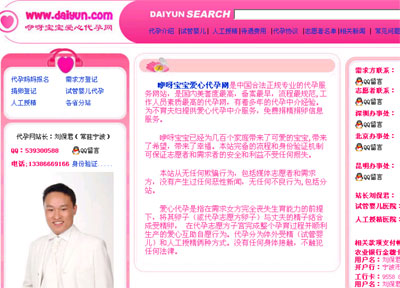Online surrogacy agency gives birth to morality debate
By Jessie Tao (chinadaily.com.cn)Updated: 2007-05-15 11:05
Infertility can leave wannabe parents seeking desperate measures, but an online service could give birth to good news, as the service offers surrogate mothers as long as the price is right.
 A screenshot of the surrogacy match-making website. [daiyun.com]  |
The agent purportedly says it has brought happiness for dozens of infertile couples through its services.
However, the agency has also met with sharp suspicion, especially when hospitals are prohibited from doing in virtro fertilization for surrogacy puposes in China.
Liu Baojun, the 28-year-old owner of the agency, says he got the idea of the surrogacy mediating service after one of his friends was forced to get divorced due to his infertility.
"I looked up lots of information and found surrogacy is a profession in some foreign countries, with special intermediary service agents registered with government departments. In China there was no official information. So, I opened this surrogacy agency about a year ago," Liu explained.
He claims his agency now has offices in over 20 cities all over the country, with more than 120 registered surrogate mothers.
The surrogates are classified into nine groups and priced according to such factors as educational background and facial appearances. He said a college girl can be paid a minimum of 70,000 yuan.
According to Liu, prospective couples pay the agency at least 5,000 yuan for information and another 5,000 yuan to be matched up with a surrogate mother, while the agency doesn't charge the surrogates.
"We get at least 10,000 yuan for every successful match." Liu says, adding that the clients are required to pay 1,000 yuan as a deposit, before showing the couples photos and information of the surrogates.
The paid expectant mothers may in return get a certain amount of cash compensation in addition to their living expenses, rent, medical fees and transportation. The sum is usually calculated based on the surrogate's two-year salary.
Liu said the surrogates are not encouraged to develop an emotional or sexual relationship with the clients, but stressed the agency won't be responsible if both parties mutually engage in sexual activities.
As to the legal issue, Liu believes surrogacy is legal, since Chinese law says nothing on such surrogate match-making services.
"We have a confidentiality agreement with the surrogates. Once she completes the contract, all concerning materials will be destroyed, " Liu said. "Surrogacy borders on both the law and morality, and does not go against the law."
But lawyers and sociologists have different opinions.
Wei Yongqiang, a lawyer with a Zhejiang-based law firm, says the interests and rights of surrogate mothers are protected when associated with a hospital, not with an agency like the one Liu has. Furthermore, the agent is not in a position to guarantee the surrogate mothers will not engage in illegal or immoral activities, such as acting as prostitutes or mistresses.
A sociology professor with Zhejiang University thinks surrogacy should be stopped since it is against social morals and constitutes a violation on human rights. Liu Zhijun adds that surrogacy often ends in tragedy, like extra-marital affairs, family disputes, and even crime.
|
||
|
||
|
|